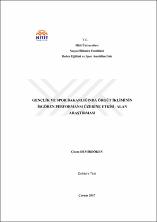Gençlik ve Spor Bakanlığında örgüt ikliminin işgören performansı üzerine etkisi: Alan araştırması
Citation
Demirdöken, Ç. (2017). Gençlik ve Spor Bakanlığında örgüt ikliminin işgören performansı üzerine etkisi: Alan araştırması (Doktora Tezi).Abstract
Örgüt iklimi günümüzde araştırmacılara konu olan bir kavram olarak karşımıza çıkmaktadır. Ülkemizde sporu yöneten ve yönlendiren kurum olan Gençlik ve Spor Bakanlığında örgüt iklimi ve işgören performansı arasındaki ilişkinin incelenmesi bu araştırmanın amacını oluşturmaktadır. Bu çalışmada, örgüt iklimi kavramı, işgören performansı, örgüt iklimi ve performans ilişkisi vurgulanmış; örgüt ikliminin boyutları ile (yapı, sorumluluk, ödül, risk, samimiyet, destek, standartlar, çatışma ve kimlik) çalışanların performans algıları arasındaki ilişki incelenmiştir. Araştırma evreni olarak Gençlik ve Spor Bakanlığı bünyesinde değişik kategoride görev yapan elemanlar esas alınmış olup, evrenin tespitinde kolayda örneklem yöntemi kullanılmıştır. Çalışmada 3 bölümden oluşan anket kullanılmıştır. Kişisel Bilgi Formu, Örgüt İklimi Soru Formu (LSOCQ) ve İş Performansı Ölçeği uygulanmıştır. Bu çalışmada elde edilen veriler SPSS 20 paket programı ile analiz edilmiştir. Yapılan analizler sırasıyla şunlardır: Anketi cevaplayanların demografik özelliklerine ait frekans tablosu, güvenirlik analizi, değişkenlerin normal dağılım göstermemesi nedeniyle Mann Whitney U ve Kruskal Wallis-H Testleri, Kruskal Wallis-H Testinde anlamlı farklılıkların görülmesi durumunda Post-Hoc Çoklu Karşılaştırma Testi, korelasyon ve regresyon analizi ile bakılmıştır. Gençlik ve Spor Bakanlığında çalışan 1000 kişinin verdiği yanıtlara göre yapı, risk, samimiyet, standart ve çatışma alt boyut puanları arttıkça işgören performansı da arttığı; sorumluluk, ödül, destek ve kimlik boyutunda ise tam tersi olarak, boyutların puanları arttıkça işgören performansı azaldığı sonucuna ulaşılmıştır. Nowadays, organizational climate has been accepted as a concept subject to examination by researchers. The examination of the relationship between organizational climate and employee performance in the Ministry of Youth and Sports, which is the institution that manages and directs sports/sporting activities in Turkey, constitutes the main objective of this research. This study focuses on the concepts of organizational climate, employee performance, and relation between organizational climate and performance and examines the relation between organizational climate and performance perception of employees. The research population consisted of employees who work in different departments within the Ministry of Youth and Sports and the convenience sampling method was used to determine the population. A questionnaire consisting of three sections was used in the study. A 'Personal Information Form', 'Organizational Climate Questionnaire' ('LSOCQF_Litwin and Stringer Organizational Climate Questionnaire') and 'Business Performance Scale' were applied. The data obtained in this study were analyzed with the SPSS 20 package software. The following analyses were carried out: A frequency table regarding participants' demographic features, reliability analysis, Mann Whitney U and Kruskal Wallis-H Tests owing to the indication of normal distribution of variables, Post-Hoc multiple comparison test for the case where significant differences in Kruskal Wallis-H Tests were observed, and correlation and regression analysis. From the answers given by 1000 people who work in the Ministry of Youth and Sports, it is concluded that as the 'structure', 'risk', 'sincerity', 'standards' and 'conflict' sub-dimension scales increased, employee performance also increased; in the dimensions of 'liability', 'reward support' and 'identification', on the contrary, as the scores for these dimensions increased employee performance decreased.


















